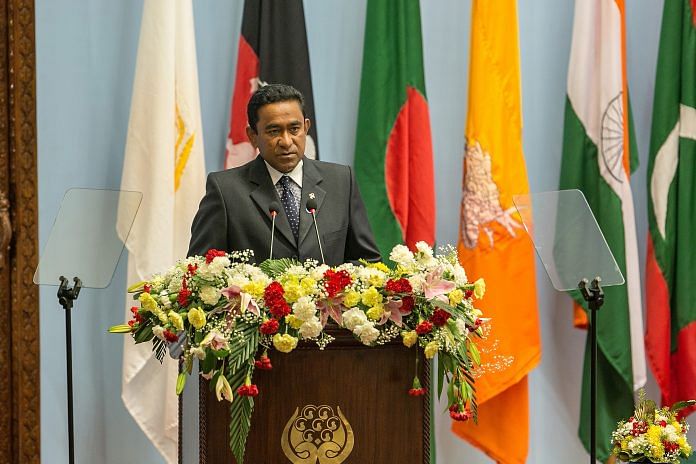Islands in Emergency
Abdulla Yameen, the president of the island nation, declared a state of emergency on Monday and sent troops to the Supreme Court, which “provoked his ire last week when it overturned criminal convictions against nine of the president’s opponents and ordered that those in jail be freed,” write Hassan Moosa and Jeffrey Gettleman in the New York Times.
“The United States said it was “troubled and disappointed” by the state of emergency, which gave the security forces sweeping powers to arrest and hold suspects, prohibited public gatherings, imposed travel restrictions and suspended parts of the Constitution.”
“The Maldives, with around 400,000 people, is usually not a big newsmaker,” they write, mentioning that the two biggest issues that plague the islands are climate change and Islamist radicalism.
“Mr. Yameen may feel confident that he can ride out the trouble, having drawn close to China and Saudi Arabia, both of which have invested heavily in the Maldives; there was even a plan afoot last year to sell an atoll to the Saudis.”
“The opposition says the president is scared to free the prisoners because he may lose his influence in Parliament, and possibly his job, if the opposition lawmakers are allowed to return.”
Ecuador is a beacon of hope in Latin America
Rafael Correa, the erstwhile president of Ecuador, had persuaded his legislature to lift the ceiling on two presidential terms in 2015, so that he could install someone else (current president, Lenin Moreno) and then return to power after Moreno’s term is over, as Putin once did.
“Then, on Sunday, came a much-deserved comeuppance: Ecuadoran voters, prompted by Mr. Correa’s own successor, voted overwhelmingly to restore a two-term presidential limit, thus blocking the planned second act. It was a victory for democracy not just in Ecuador but also in a region where numerous rulers have sought to entrench themselves in power,” editorializes the Washington Post.
“The caudillo clearly expected that his successor, Lenín Moreno, would follow his lead. Instead, to his credit, Mr. Moreno has moved to clean up the mess he inherited. He reached out to the media and businesses and let citizens know for the first time how much had been borrowed from China. When Mr. Correa’s vice president was implicated in a corruption scandal, Mr. Moreno made no attempt to shield him.”
“Predictably, Mr. Correa has called Mr. Moreno a traitor. In fact, Mr. Moreno is a moderate leftist who happens to believe in democracy. That has made him popular: His approval rating has soared, while Mr. Correa has been pelted with eggs during his recent public appearances.”
“The struggle over democracy in Latin America has been a seesaw battle in recent months. Venezuela has sunk deeper into dictatorship, and corruption scandals have destabilized Brazil and Peru. Ecuador, however, now appears to be joining Argentina in shaking off the destructive authoritarianism that spread across the region at the turn of the century. It’s a small but important step forward,” the Washington Post writes.
Denuclearizing has taken a hit
“The new U.S. nuclear strategy unveiled on Feb. 2 by the administration of President Donald Trump has splashed cold water on the world’s hopes for a future without nuclear weapons,” Asahi Shimbun editorializes.
The Trump administration’s Nuclear Posture Review is a departures from the course Obama was trying to chart. The report details the security threats posed especially by Russia, China and North Korea, saying that the situation has worsened considerably since the last Nuclear Review.
“But the notion that national security can be maintained only by overwhelming nuclear firepower is hopelessly anachronistic,” Asahi writes.
“If it keeps maintaining a massive stockpile of ready-to-use nuclear weapons, the United States will contribute to increasing the risks of accidental nuclear war due to human error and theft of nuclear material, exposing the entire world to the danger.”
“Trump’s apparent inability to imagine the terrifying destruction nuclear arms could wreak and his desire to secure America’s military superiority over others constitute the largest concern for the future of the world.”



